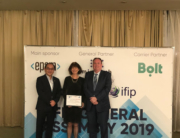The 7th International IFIP Cross Domain Conference for Machine Learning & Knowledge Extraction (CD-MAKE) will be held from 29 August–1 September, 2023 at the University of Sannio in Benevento, Italy.
CD-MAKE organisers have announced a Call for Papers, inviting speakers interested in participating in the event to immediately submit papers for consideration.
A joint effort between IFIP TC 5, TC 12, IFIP WG 8.4, WG 8.9 and WG 12.9, CD-MAKE will be held in conjunction with the International Conference on Availability, Reliability & Security, ARES 2023.
Machine Learning and Knowledge Extraction (MAKE) is the workhorse of Artificial Intelligence (AI). Successful human-centred AI needs a concerted effort without boundaries, supporting collaborative and integrative cross-disciplinary research between experts cross-domain.
Deadlines:
Paper Submission Deadline Extended: April 17, 2023 (AoE)
Author Notification: June 01, 2023
Camera Ready (hard deadline!): June 22, 2023 (AoE)
Conference: August 29 – September 1, 2023
In today’s digital age, we generate an enormous amount of data. Companies, organisations, and governments all over the world are struggling to make sense of this vast amount of information. Fortunately, the fields of machine learning and knowledge extraction – the workhorse of Artificial Intelligence – are supporting data analytics, helping us to extract valuable insights from large datasets.
Machine learning involves the use of algorithms and statistical models to identify patterns and insights in large datasets, enabling us to make more informed decisions based on data-driven insights. Knowledge extraction, on the other hand, involves the automatic identification of structured and unstructured data to extract useful information.
These fields are transforming the way we interact with data and make decisions. For example, machine learning algorithms can be used in a wide range of applications, including image and speech recognition, natural language processing, predictive analytics, and more. There are endless applications, including the life sciences, medicine, healthcare, smart farming and forestry, etc.
However, it is important to remember that these technologies are ultimately designed to serve human needs and demands. Consequently, a human-centred approach to AI is essential to ensure that these technologies are developed and deployed in a way that is aligned with human values and goals, to foster trust, enable re-traceability, explainability and interpretability. This approach considers the ethical implications of AI and ensures that these technologies are developed in a way that is transparent, explainable, and accountable.
In addition, it is important to bring together the best minds from academia and industry, to collaborate and share knowledge, and to work together to address the challenges that arise in this rapidly evolving field. This collaboration can lead to more robust algorithms, more efficient tools and techniques, and faster development of new applications.
Bringing together academia and industry is essential for advancing research and development in machine learning and knowledge extraction. Academia is where fundamental research is conducted, and new algorithms and techniques are developed. Industry, on the other hand, is where these algorithms and techniques are applied to solve real-world problems and create innovative products and services. By bringing together these two worlds, we can foster collaboration, knowledge exchange, and innovation. Industry can provide academia with access to real-world data and problems, and academia can provide industry with cutting-edge research and ideas. This collaboration can lead to more robust algorithms, more efficient tools and techniques, and faster development of new applications.
The goal of the IFIP CD-MAKE conference is to act as a catalysator, to bring together academia and industry in a cross-disciplinary manner, to stimulate fresh ideas and to support human-centered AI:
Steering Committee
- Andreas HOLZINGER, Human-Centered AI Lab (Holzinger Group), University of Natural Resources and Life Sciences, Austria
- Peter KIESEBERG, St. Pölten University of Applied Sciences, Austria
- Edgar WEIPPL, SBA Research & University of Vienna, Austria
- A Min TJOA, Vienna University of Technology, Austria
PC Chairs
- Federico CABITZA, University of Milano-Bicocca, Italy
- Andrea CAMPAGNER, University of Milano-Bicocca, Italy
Information about the conference committee can be found here.
Submission guidelines are available here.





